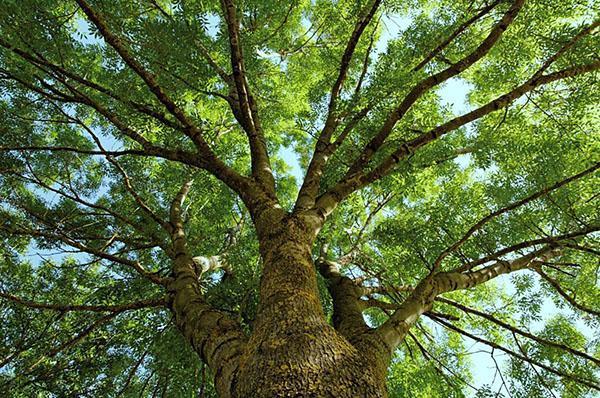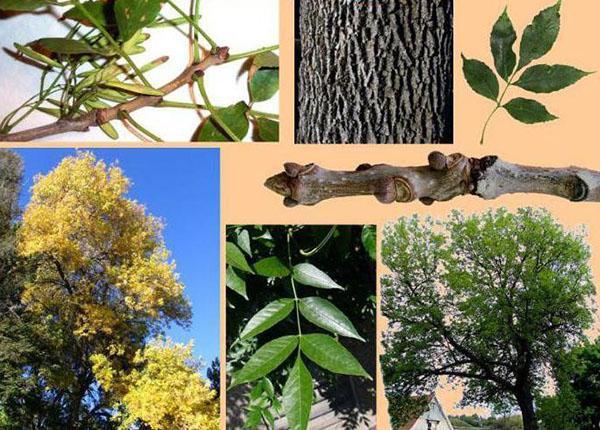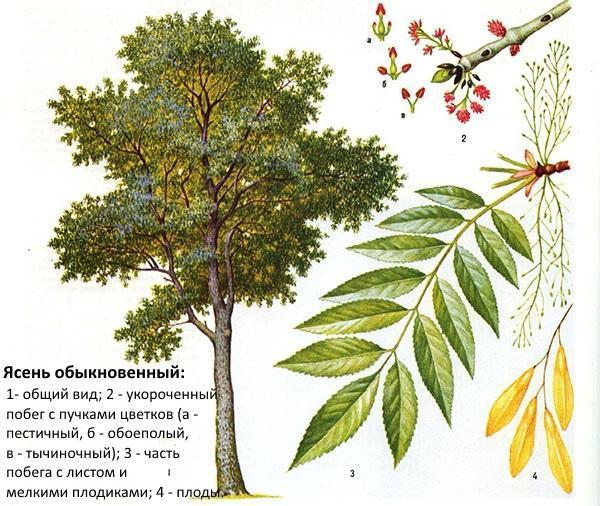Majestic Garden Warrior - Ash Tree
 The silent yet awe-inspiring ash tree has been a symbol of justice and security for centuries. Ancient Greek artisans made spears from its wood, as well as handles for various types of weapons. Painters loved to depict the warlike goddess of retribution with a graceful branch of this perennial plant. At the same time, some peoples believed that its juice was a deadly poison for the most dangerous snakes on earth. A shirt soaked in such a liquid was a real body armor for a valiant warrior.
The silent yet awe-inspiring ash tree has been a symbol of justice and security for centuries. Ancient Greek artisans made spears from its wood, as well as handles for various types of weapons. Painters loved to depict the warlike goddess of retribution with a graceful branch of this perennial plant. At the same time, some peoples believed that its juice was a deadly poison for the most dangerous snakes on earth. A shirt soaked in such a liquid was a real body armor for a valiant warrior.
With rheumatism, healers were advised to do sessions of rubbing with a decoction of the kidneys, as well as the bark. The infusion of the leaves served as an antipyretic agent.

A rendezvous with ash
 These monolithic representatives of the Olive family are found in the temperate latitudes. The southern and central regions of Russia, as well as Ukraine, are rich in whole groves / forests, consisting of such giants. Hundreds of naturalists are exploring about 50 varieties of this woody plant with unceasing passion. At the first meeting with an ash tree, many people note its delightful features.
These monolithic representatives of the Olive family are found in the temperate latitudes. The southern and central regions of Russia, as well as Ukraine, are rich in whole groves / forests, consisting of such giants. Hundreds of naturalists are exploring about 50 varieties of this woody plant with unceasing passion. At the first meeting with an ash tree, many people note its delightful features.
High growth
 The average height of these rocks is 12-15 m, and the maximum is 30 meters. Nevertheless, some decorative species (for example, the Griffith variety) grow only up to 1.5 m. There are also 40-meter giants that are more than 100 years old. One of them grows serenely in Uzhgorod.
The average height of these rocks is 12-15 m, and the maximum is 30 meters. Nevertheless, some decorative species (for example, the Griffith variety) grow only up to 1.5 m. There are also 40-meter giants that are more than 100 years old. One of them grows serenely in Uzhgorod.
Openwork crown
 The crown of an ash tree is formed by arched long branches, because of this it has a spreading character. Due to the high growth of the tree, the crown stretches and forms an original dome in the form of a pyramid. A luxurious openwork structure is provided by the leaves located on the branch opposite each other. They are oblong and medium in size. Photons of light shine through their translucent canvas, creating an unforgettable show. A barely perceptible breath of wind, and these rays begin to play with completely new special effects.
The crown of an ash tree is formed by arched long branches, because of this it has a spreading character. Due to the high growth of the tree, the crown stretches and forms an original dome in the form of a pyramid. A luxurious openwork structure is provided by the leaves located on the branch opposite each other. They are oblong and medium in size. Photons of light shine through their translucent canvas, creating an unforgettable show. A barely perceptible breath of wind, and these rays begin to play with completely new special effects.
Extravagant "earrings"
 It is imperative to complement the vivid description of the ash tree with its inflorescences and fruits. On April and May days, you can watch this exciting extravaganza of colors. Different species of the Olive family can have both snow-white and burgundy or even purple flowers in the form of panicles. All these "decorations" look amazing on completely bare grayish-brown branches.
It is imperative to complement the vivid description of the ash tree with its inflorescences and fruits. On April and May days, you can watch this exciting extravaganza of colors. Different species of the Olive family can have both snow-white and burgundy or even purple flowers in the form of panicles. All these "decorations" look amazing on completely bare grayish-brown branches.  A few weeks later, the rudiments of leaves appear on the shortened shoots. From flower bunches, achenes develop, resembling the wings of a moth. On one branch of such plates there can be up to 50 pieces. These gorgeous earrings give the plant an amazing look.
A few weeks later, the rudiments of leaves appear on the shortened shoots. From flower bunches, achenes develop, resembling the wings of a moth. On one branch of such plates there can be up to 50 pieces. These gorgeous earrings give the plant an amazing look.
Gardeners recommend planting several specimens in a small area so that they can pollinate among themselves.
Indeed, on the same tree, male and female flowers ripen at different times, so they do not have time to exchange genetic information. Unfortunately, these panicles do not attract insects.
What is hidden from view
 The whole secret of the lush luxury of this perennial plant is hidden in the ground at a depth of no more than 1.5 m.It is the root system that supplies the breed with moisture and nutrients. In most species of this family, it does not have a taproot. As a result, the rhizome does not grow very deeply, spreading only on the surface. Yet plants can adapt to their environment. Then a central core sprouts in them, which sprouts out processes. They can find moisture even at a depth of 3 meters.
The whole secret of the lush luxury of this perennial plant is hidden in the ground at a depth of no more than 1.5 m.It is the root system that supplies the breed with moisture and nutrients. In most species of this family, it does not have a taproot. As a result, the rhizome does not grow very deeply, spreading only on the surface. Yet plants can adapt to their environment. Then a central core sprouts in them, which sprouts out processes. They can find moisture even at a depth of 3 meters.
It is not worth trimming the branches of a woody plant to form the correct crown. It is best to carefully remove dried out areas or tops.
Worthy exhibit for a garden
 When creating a landscape interior on a personal plot, it is important to give a special place to ash. It will perfectly fit into the local garden color, and most importantly, will delight all neighbors with its grandeur and beauty. You should choose a specific type of breed depending on the goals pursued by the gardener. Here are some of the options:
When creating a landscape interior on a personal plot, it is important to give a special place to ash. It will perfectly fit into the local garden color, and most importantly, will delight all neighbors with its grandeur and beauty. You should choose a specific type of breed depending on the goals pursued by the gardener. Here are some of the options:
- tall specimens with a pyramidal crown are suitable for monumental / lonely exhibits;
- undersized, horizontal and spherical varieties - a godsend in creating a hedge;
- extravagance to the garden will give weeping varieties, the branches of which are unusually curved, like a willow.
 To plant these amazing ash trees, you need to find a flat area and preferably without shady places. However, the ground should be sufficiently moist, but without the formation of stagnant water. After all, these plants can easily tolerate droughts, as well as frosty winters. The key to the active and successful development of the tree largely depends on the planting of the seedling.
To plant these amazing ash trees, you need to find a flat area and preferably without shady places. However, the ground should be sufficiently moist, but without the formation of stagnant water. After all, these plants can easily tolerate droughts, as well as frosty winters. The key to the active and successful development of the tree largely depends on the planting of the seedling.
Planting ash trees in saline areas should be avoided. You can give preference to areas with a high calcium content. In this case, the acidity of the soil should vary within 6-7 pH.
Soil features
When buying a seedling, you need to pay attention to what form it is in. The roots should be hermetically sealed with an opaque material or in a container. Before planting, the rhizomes should be soaked by soaking them with moisture. In turn, the hole will need to be made 33% larger than the earthen lump of the seedling rhizomes.  The fourth part should be filled with drainage, consisting of:
The fourth part should be filled with drainage, consisting of:
- rubble;
- pebbles;
- coarse sand.
Thanks to this "pillow", each layer of earth will dry out evenly. Moreover, there will be no seals in it, on which salt formations settle. Moisture will not be able to accumulate in the roots, which can lead to sourness and decay. The composition of the soil substrate should include:
- one piece of sand;
- two parts of humus;
- 1 hour deciduous land.
 After that, the near-stem area must be covered with mulch (layer height - 15 cm). It can consist of both peat and wood chips. The first four days, the seedling needs abundant watering. If possible, the site should be weeded, deepening the boot by no more than 7 cm.
After that, the near-stem area must be covered with mulch (layer height - 15 cm). It can consist of both peat and wood chips. The first four days, the seedling needs abundant watering. If possible, the site should be weeded, deepening the boot by no more than 7 cm.
Nitrogen fertilizers recommended to be applied at the beginning and at the end of spring. In the autumn, the plant can be fed with solutions of Kemir (station wagon) or nitroammofosk. For the winter period, you need to wrap the trunk with sacking.  Such precautions apply only to 3-year-old specimens.
Such precautions apply only to 3-year-old specimens.
It should be borne in mind that loose soil will surely sag after planting. For tall trees, this is a disaster. Therefore, the roots must be planted 10-20 cm above the horizon.
 The mighty ash tree also has many enemies. These include the bark beetle, ash dwarf, and branch / trunk cancer. Growths, rot and other formations can be safely removed by treating the wounds with a solution of activated carbon.
The mighty ash tree also has many enemies. These include the bark beetle, ash dwarf, and branch / trunk cancer. Growths, rot and other formations can be safely removed by treating the wounds with a solution of activated carbon. All other pests must be eliminated with insecticides. As a result of such careful care, the ash tree will grow large (up to 5 meters at home) and healthy.
All other pests must be eliminated with insecticides. As a result of such careful care, the ash tree will grow large (up to 5 meters at home) and healthy.